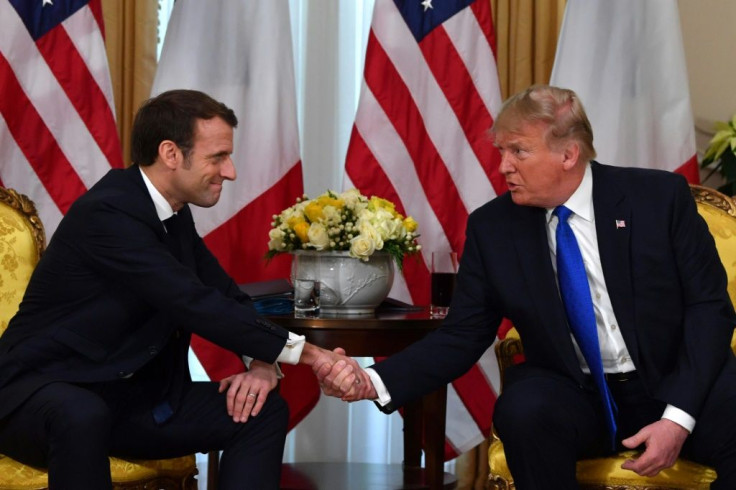A US - France Trade War? France Vows EU Retaliation After Trump Threatens New Tariffs

The French government warned the United States the European Union will take action if President Donald Trump imposes tariffs on some $2.4 billion of French imports.
However, during a live press conference in London on Tuesday between Trump and French Prime Minister Emmanuel Macron, Trump said: “We have had a minor dispute but I think we will probably be able to work it out. I am sure within a short period of time things will be looking very rosy, we hope. That’s usually the case between the two of us. We get it worked out.”
Earlier on Tuesday, French officials strongly criticized Trump. Bruno Le Maire, France’s finance minister, called the tariffs “unacceptable” and vowed the EU would find a way to strike back.
“The European Union would be ready to retaliate,” Le Maire told French radio. “This is not the behavior we expect from the United States vis-a-vis one of its principal allies, France, and, in a general manner, Europe.”
Daniel Rosario, the European Commission’s spokesman for trade and agriculture, told reporters in Brussels on Tuesday: “In this, as in all other trade related matters, the European Union will act and react as one.”
Rosario added that the EU would “seek immediate discussions with the United States on how to solve this issue amicably.”
On Monday, Trump proposed tariffs of up to 100% on $2.4 billion of French goods -- including cheese, champagne, wine, handbags and porcelain – in reaction to France’s new digital-services tax that the U.S. thinks will unnecessarily penalize American tech firms like Apple (AAPL), Amazon (AMZN), Facebook (FB) and Google, a unit of Alphabet Inc. (GOOGL).
That new tax, unveiled by France in July, was designed to guarantee that foreign tech firms pay their tax obligations. The French have said they would repeal the tax if the Organization for Economic Cooperation and Development establishes a solid international framework on how to tax digital services.
The French law applies a 3% levy on revenue that big tech companies generate in France. In August, President Emmanuel Macron said U.S. and French officials agreed France would reimburse U.S. tech firms if they paid more taxes under the French tax regime than they would under tax rules that the Organization for Economic Cooperation and Development is trying to hammer out.
France said tax rules need to be restructured due to a changing global economy that focuses on data rendering old tax laws archaic.
The Internet Association, an American lobbying group which represents internet companies, said France’s tax is “one of a growing number of concerning unilateral tax regimes around the world.”
Italy, Austria and Britain are also considering similar digital taxes.
For now, Trump is balking.
“They are American companies, I don’t want France taxing American companies,” Trump said in London on Tuesday.
On Monday, U.S. Trade Representative Robert Lighthizer said the tariff plan "sends a clear signal that the United States will take action against digital tax regimes that discriminate or otherwise impose undue burdens on U.S. companies.”
Trump’s latest threat came on the heels of other levies on European goods – including a decision last year to slap duties on EU steel and aluminum imports and a move this year to impose tariffs some $7.5 billion in aircraft, food and other goods from the EU.
The U.S. imported about $52 billion of French goods in 32018.
© Copyright IBTimes 2024. All rights reserved.





















